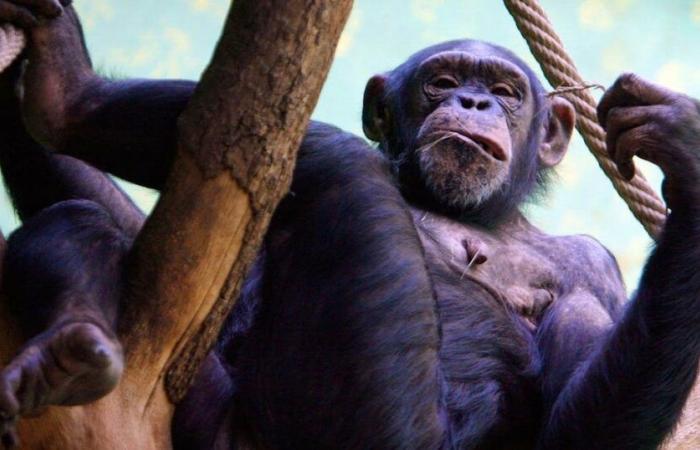According to a thought experiment, a monkey who tapped endlessly on a keyboard would one day write the complete works of Shakespeare. This is not true, say two mathematicians today.
KEYSTONE/Eddy Risch
Two Australian mathematicians have challenged an old adage that a monkey typing endlessly on a typewriter would eventually write the entire works of William Shakespeare. Note carefully: without this monkey having the slightest idea of what he typed.
This thought experiment, known as the “infinite monkey theorem,” has long been used to illustrate the principles of probability and chance. In more detail, if a monkey presses enough keys, it is likely that it will eventually type exactly the text of all of Sheakespeare’s published texts.
A new study led by mathematicians Stephen Woodcock and Jay Falletta, researchers in Sydney, however, revealed that the probability of achieving this result is too low, as reported by the BBC. This is because the time it would take for a typing monkey to reproduce Shakespeare’s plays, sonnets and poems would be longer than the expected lifespan of our universe. The researchers conclude that the theorem, although mathematically correct, is “misleading.”
The study was peer-reviewed and found to be correct.
“Bananas” would already take ages
The research duo also took a close look at a single monkey’s typing ability. To give the theorem another try, they calculated the probability that all chimpanzees would type letters throughout their lives. There are currently around 200,000 living specimens.
But according to the results, even if every living chimpanzee pressed one key per second until the end of the universe, they would not be able to type the works of Shakespeare – it is not excluded that this would happen, but the probability is infinitesimal.
After all, the chance that one of these 200,000 monkeys will correctly type the word “Bananas” is 5%. And the chance of a chimpanzee constructing a random sentence like “I am a chimpanzee, therefore I am” is 1 in 10 million billion billion, research shows. This corresponds to a 1 with 25 zeros.
End of the universe: a number with 1000 zeros
The study authors conclude: “It is not plausible that, even with an improvement in typing speed or an increase in the chimpanzee population, monkey work would ever be a usable means for developing written works non-trivial.
It now remains to be seen when the universe will cease to exist, or rather on what hypothesis mathematicians have based their calculations on this subject. They rely on the theory of thermal death. According to this theory, the universe expanded and cooled until everything in it disintegrated and disappeared. According to calculations, this would happen in approximately11 000 years. There is no term for this number, it is a 1 with 1000 zeros.
Which gives:
In the meantime, 200,000 monkeys would press keys and not even have written Hamlet. “This finding places the theorem among other probability puzzles and paradoxes… where using the idea of infinite resources yields results that do not match what we get when we take into account the limitations of our universe,” says mathematics professor Woodcock in a statement about the work.
This article was written using artificial intelligence (AI). All content taken from the AI is verified by the editorial staff.






